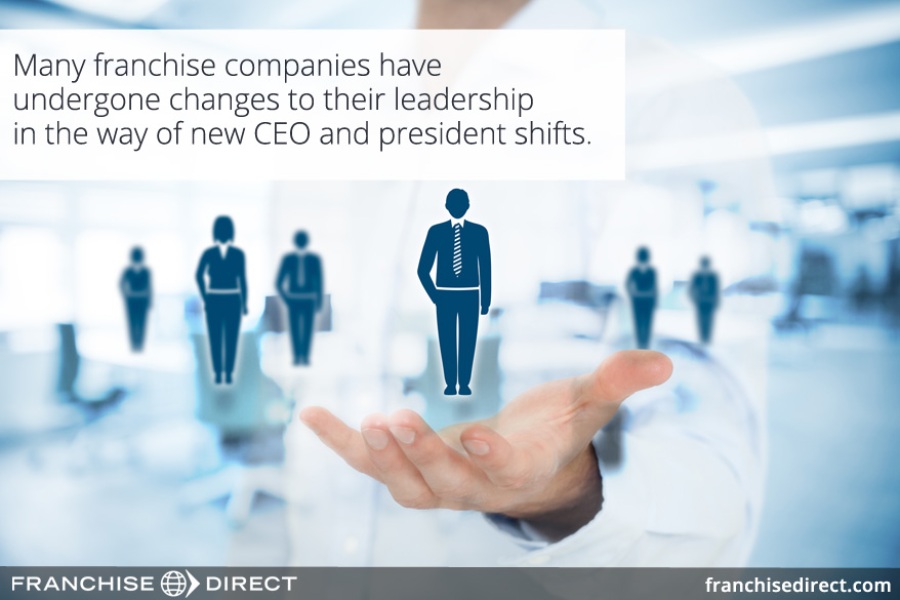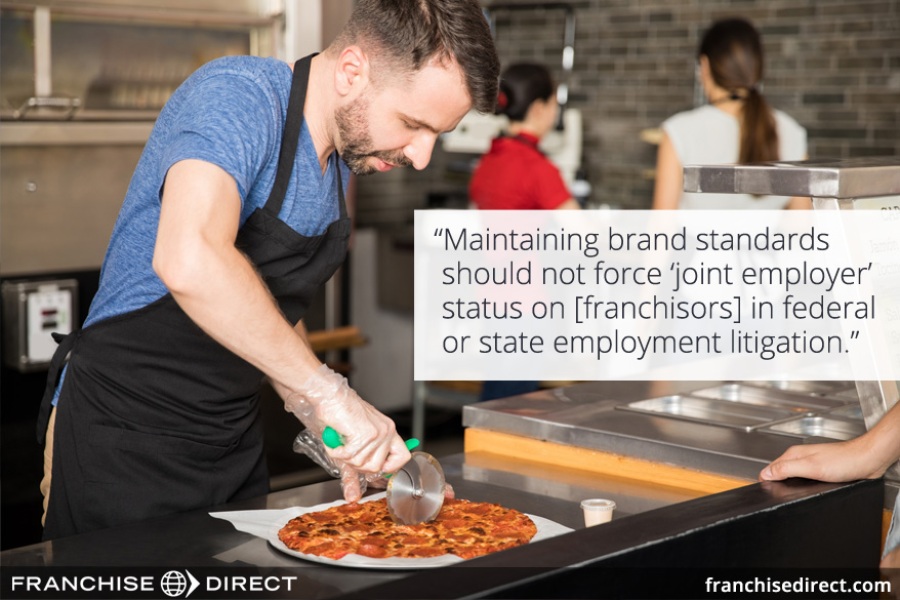
Recent Franchise Leadership Changes
The past year saw a batch of corporate changes at franchise head offices. In last year’s Top 100 report, we noted that the number of reorganizations at the corporate-level of franchises were becoming so common that they were hard to keep up with. Even in our most recent food report, we made mention of the mergers and acquisitions occurring in the food franchise industry—and they’ve continued.
In fact, according to Restaurant Business Online, more than 70 chains have been sold over the past two years—many of them have been sold to existing chains. Since the food report was published in July, here’s a taste of what has happened:
- Focus Brands, the parent company of Auntie Anne’s (#70), Carvel, Cinnabon, McAlister's Deli, Moe's Southwest Grill (#78) and Schlotzsky’s, acquired Jamba Juice.
- Wendy’s(#15) sold its interest in Arby’s (#28) and Buffalo Wild Wings back to their parent company Inspire Brands, which later acquired drive-in franchise Sonic.
- Bojangles (#39) went private following its $593 million sale to Durational Capital Management LP and The Jordan Company, L.P.
- In December, Jollibee (#41) attained a 100% stake in Smashburger. The Filipino fast food franchise had first acquired a 40% stake in the US burger chain in October 2015, followed by an ownership increase to 85% in February 2018.
Beyond the acquisitions and divesting, many franchise companies have undergone changes to their leadership in the way of new CEO and president shifts.
The most high profile of these changes is Subway (#8). Three years after taking over for her brother co-founder and longtime CEO Fred DeLuca, Suzanne Greco stepped down as CEO of Subway on June 30. Prior to becoming CEO, Greco held many positions in the company since starting as a sandwich artist in 1973, including more than 20 years in research and development.
Trevor Haynes, the sandwich franchise’s former chief business development officer, took over CEO duties from Greco on an interim basis.

At the time of the change, Greco said, “I love the brand and the company, and I always will, but it’s time for me to have more balance in my life. I feel very good about the strategic moves we’ve made in the last three years, and I have confidence in the future of the company.” She continues to have a role with Subway as a senior advisor.
Also retaining a role with his former company while stepping down as CEO is Nigel Travis, the now former head of Dunkin’ Brands. With the company since 2009, the biggest accomplishments from Travis’ tenure were taking Dunkin’ Brands public in 2011 and overseeing an increase in operating units of approximately 6,000. He now serves as executive chairman of the board, focusing on developing international business for Dunkin’ Donuts (#6) and Baskin-Robbins (#10).
In contrast to Subway, Dunkin’ Brands had been planning its CEO transition for a year-and-a-half. “When we recruited Dave [Hoffmann] to Dunkin’ Brands 18 months ago with the intent that he would succeed me as CEO, we knew that we were getting a world-class leader with extensive restaurant industry expertise, and he has exceeded all of our expectations,” Travis said in July when the change occurred.
Another planned leadership transition in 2018 happened at Sport Clips (#71). In May, the haircare franchise announced the election of Edward Logan as president. Edward is the son of Sport Clips founder and CEO Gordon Logan.
During the company’s 25th anniversary celebration, Gordon Logan said, “Edward has grown up in the business and is playing a key role in the company's growth, setting new standards for excellence in store operations. It's been rewarding during the meeting to share this news while looking back at Sport Clips’ humble beginnings to where we are today as one of the top haircare providers in the U.S. and Canada. I look forward to working with Edward in his new role, along with our outstanding Leadership Team, to grow Sport Clips in new areas and ensure the championship experience we deliver for our exceptional franchisees and clients.”
Also transitioning out of day-to-day company running duties is Tariq Farid of Edible Arrangements (#98). The founder of the fresh-fruit gift franchise turned over CEO responsibilities to former Tropical Smoothie Cafe CEO Mike Rotondo in July.
Farid is pivoting his attention to growing the overall umbrella company of Edible Brands, which started with the franchise but now encompasses technology, supply-chain, and other businesses. These are passion points for Farid, who designed all the computer systems Edible Arrangements franchisees use. “Everything is in place and the timing is perfect for us to move forward with adding significant new revenue streams for our brand and our franchisees,” Farid said of his shifting focus.
McDonald’s (#1) also saw a change in its leadership. At the end of the year, Doug Goare retired as McDonald’s international lead markets president. With Goare’s retirement, the fast food franchise decided to revamp its whole organizational structure.
The new structure is the second organizational reorganization the company has made in the past few years in hopes of streamlining its processes. As McDonald’s CEO Steve Easterbrook said at the time of Goare’s retirement announcement, “This new organizational structure provides us the opportunity to continue building on our progress.”
The Joint Employment Liability Debate Lingers On
For the past two years, we’ve discussed the legal battle over the definition of joint employment in the US as it pertains to the franchising industry. While the debate over joint employment liability in franchising didn’t reach a conclusion in 2018, it may have taken a step towards a resolution.
In mid-September the National Labor Relations Board (NLRB) proposed a new rule that would solidify a standard for determining when companies can be held liable for labor law violations committed by subcontractors.
The proposed new rule follows years of legal wrangling that began with a 2015 NLRB ruling for a case that combined lawsuits involving McDonald’s and Browning Ferris Industries. The ruling expanded the joint employment standard to “indirect” control over an employee’s working conditions, meaning a company that exercises any control over working conditions, or reserves the authority to do so, could be held liable for working conditions—a significant change compared to the rule that had been previously used.
It may have been an unintended consequence, but the 2015 ruling potentially made franchise headquarters (aka franchisors) responsible for working conditions at any franchise location, alongside the individual franchisee who runs it. The decision was met with much pushback from franchise industry officials and eventually, following NLRB board member changes, was overturned in 2017. At that point, the ruling meant returning the pre-2015 standard for joint employer designation, which was “direct and immediate control” over employees.
However, the return to the pre-2015 standard only lasted a year before it had to be tossed out. An ethics official found that one of the board members for the 2017 decision should have been disqualified from participating in the case because of a conflict of interest.
Officials from the International Franchise Association (IFA) have reportedly praised the new proposal, as it isn’t as broad as the 2015 ruling. Also of special note to franchises, a settlement to the 2015 lawsuits against McDonald’s was proposed in early 2018, just after the 2017 NLRB ruling was tossed out. However, a NLRB administrative law judge rejected that proposed settlement in July, as reported by Reuters.
In related news, introduced to Congress at the end of August, H.R.6695 - Trademark Licensing Protection Act of 2018 seeks to clarify “that maintaining brand standards should not force ‘joint employer’ status on [franchisors] in federal or state employment litigation,” according to Robert Cressanti, President and CEO of the IFA.

Trademarks, such as logos, the colors used on uniforms, etc., are an significant part of the franchise model. They are the way people identify a certain brand and are often attached to customers’ expectations of what to expect from a company. The Trademark Licensing Protection Act seeks to establish as law that a franchisor’s enforcement of brand standards—rules given for using the trademarks—don’t constitute control from a joint employment perspective. Rather, proponents of the act view it as a protection device for the franchisor’s intellectual property. So far, no additional action has been taken on the act.
Also, individual states are also weighing in on the matter. For example, in December the Ohio Senate passed a bill that if passed by the Ohio House will exempt a franchise’s corporate office from liability for labor violations committed by franchisees within the state.
Joint Employment Rules Abroad
It’s not just the US where joint employment liability is becoming a hot-button topic in franchising. Before franchising internationally, it’s paramount that franchisors do their research and engage lawyers knowledgeable about the ins and out of franchising as well as the specific laws of the countries the franchisor is interested in expanding into.
Below is a brief overview of joint employment in a few locations around the world.
In Australia, there is legislation called the Fair Work Amendment (Protecting Vulnerable Workers) Act 2017. The act covers “Responsible Franchisor Entity,” which is a term encompassing instances when a franchisor could’ve “reasonably” known that a franchisee would exploit employment laws to the detriment of workers. Under the act, the franchisor wouldn’t face consequences if it took “reasonable steps” to prevent the franchisee from circumventing employment laws.
According to Will Woods, CFE and Emily Harbison in an editorial for the International Franchise Association, the factors that a court may consider in determining if a franchisor took reasonable steps include:
- The size and resources of the franchisor;
- Any action taken to ensure the franchisee had a reasonable knowledge and understanding of the legal requirements;
- The franchisor's arrangements for assessing the franchisee's compliance; and
- The extent to which the franchisor's arrangements with the franchisee encouraged compliance with workplace laws.
For these reasons, many experts suggest Australian franchisors take a proactive approach to encouraging compliance amongst its franchisees.
Elsewhere, under current laws in Canada, different entities may be treated as one employer if they simply carry on related business activities.
Under Federal Labor Law in Mexico, two or more companies may be jointly liable for the labor and social security obligations owing to an employee, including severance.














